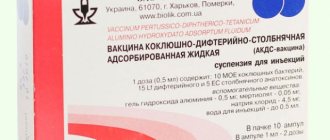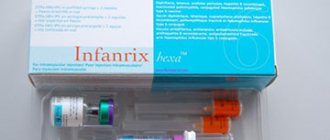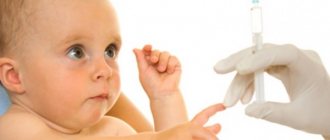A two-month-old baby is noticeably different from a newborn. The baby becomes strong, mobile, shows positive and negative emotions, and also responds to treatment. The child grows, and along with him the risk of dangerous diseases increases. Therefore, parents have to visit the doctor monthly for immunization.
If all vaccinations were given according to plan, then by two months the newborn is already protected from tuberculosis and hepatitis B. However, this protection needs constant support, so revaccination is required according to the schedule.
Why vaccinate at 2 months?
The main purpose of administering vaccines to a two-month-old baby is to protect against dangerous diseases. During immunization, a weakened type of infection is introduced. The immune system recognizes the “stranger” and produces protective substances against it – antibodies. From this moment on, the child’s body knows what the pathogen looks like and how it can be dealt with. If in the future the baby encounters an infection, the immune system will remember the “stranger” and send antibodies in response to his attack. In this way, the body learns to protect itself from dangerous and not so dangerous diseases.
The second reason explaining the need for vaccinations comes down to the ineffectiveness of medications against dangerous pathogens. Using the example of viral hepatitis, it can be argued that preventing its occurrence is much easier than curing it later. Despite the great capabilities of modern medicine, many diseases are treated symptomatically. This means that medications relieve bothersome symptoms, but do not affect the disease itself. As a result, the risk of complications that often occur in modern children increases.
By getting vaccinations at 2 months, parents will make life easier not only for their baby, but also for themselves. The baby's body will develop strong immunity against fatal diseases. It is important to consider that many vaccinations require revaccination, so the immunization that has started must be completed.
Vaccination against pneumococcal infection
Until a few years ago, this vaccine was not administered to children. However, in 2014, changes were made to the vaccination calendar. It was decided to make vaccination against pneumococcus mandatory and finance it from the budget. This made it possible to protect children from dangerous diseases caused by this pathogen.
Many parents mistakenly believe that pneumococcal serum protects against pneumonia (pneumonia). However, this is not the only disease that can be prevented with a vaccine. Immunization protects against all types of infectious processes caused by pneumococcus:
- otitis;
- meningitis;
- sinusitis;
- rhinopharyngitis;
- tonsillitis;
- bronchitis and others.
Previously, broad-spectrum antibiotics were used to combat pneumococcal infection. The penicillin series was considered one of the most effective. However, in recent years, resistance to these drugs has become increasingly common in young children. In addition, many are intolerant to penicillins. Therefore, a vaccine against pneumococcal infection is the best choice for a child. The serum forms lasting immunity, prevents infection, and also virtually eliminates the need to use antibiotics in case of accidental contact with a pathogen.
Vaccine names
In immunology, two types of vaccines against pneumococcal infection are used:
- Synflorix is a Belgian drug that is used to immunize young children;
- Prevenar 7 or 13 is an American serum used for immunization of the population without age restrictions.
Pneumo 23 vaccine against pneumococcal infection , but it is used only in adults and children over 2 years of age.
How is vaccination tolerated?
The first vaccination against pneumococcus is given to children at 2 months. Before this, the child does not encounter this pathogen. Therefore, the body may respond with an unusual reaction to contact with the serum. The most common side effects in children are:
- increase in body temperature to 38-38.5 degrees;
- slight enlargement of lymph nodes on the body;
- increased tearfulness;
- loss of appetite;
- drowsiness;
- pain at the injection site and slight swelling.
The ailments persist for 2-3 days, after which they go away on their own. Parents should first discuss possible reactions to vaccination with their pediatrician. The doctor will tell you what to expect from immunization at 2 months and what available means can be used to alleviate the baby’s condition.
Many parents are afraid to vaccinate against pneumococcus at 2 months, since the vaccine has been introduced relatively recently (since 2014). However, the drugs have proven themselves to be good, because their use significantly reduces the risk of contracting dangerous infections.
Mandatory vaccinations for a child at 2 months???? during routine vaccination
A two-month-old baby is very different from a newborn. The child becomes strong, mobile, shows positive and negative emotions and responds to treatment. The child grows, and along with him the risk of dangerous diseases increases. Therefore, parents should go to the doctor every month to get vaccinated.
If all vaccinations go according to plan, the newborn is protected from tuberculosis and hepatitis B only after two months. However, this protection needs constant support, so routine revaccination is necessary.
Why vaccinate at 2 months?
The main purpose of administering vaccines to a two-month-old baby is to protect against dangerous diseases. Immunization involves introducing a weakened type of infection. The immune system recognizes the 'stranger' and produces protective substances - antibodies.
From now on, the child’s body knows what the pathogen looks like and how to fight it. When the child encounters an infection in the future, the immune system will remember the 'stranger' and develop direct antibodies in response to its attack.
Thus, the body learns to protect itself from dangerous and not so dangerous diseases.
The second reason for the need for vaccination is the ineffectiveness of drugs against dangerous pathogenic microorganisms. Using the example of viral hepatitis, it can be argued that its prevention is much simpler than subsequent treatment.
Despite the great capabilities of modern medicine, many diseases are treated symptomatically. This means that the medications eliminate the warning symptoms, but do not affect the disease itself.
The result is an increased risk of complications common to children today.
With vaccinations at the age of 2 months, parents make life easier not only for their baby, but also for themselves. A child’s body develops a strong immunity against deadly diseases. It is important to remember that many vaccinations require a subsequent vaccination, so vaccinations that have started must be completed.
What vaccines are given to children at 2 months?
If all vaccinations have been completed according to the vaccination schedule for up to two months, then the child will receive two vaccinations at this age. The first protects against pneumococcal infection, the second expands and increases the effectiveness of protection against hepatitis B.
Vaccination against pneumococcal infection
Several years ago, this vaccine was not given to children. However, in 2014 the vaccination schedule was changed. It was decided to make vaccination against pneumococcus mandatory and finance it from the budget. This will protect children from dangerous diseases caused by this pathogen.
Many parents mistakenly believe that pneumococcal serum protects against pneumonia (pneumonia). However, this is not the only disease that can be prevented by a vaccine. Vaccination protects against all types of infections caused by pneumococcus:
- otitis;
- meningitis;
- sinusitis;
- nasopharyngitis;
- tonsillitis;
- bronchitis, etc.
Broad-spectrum antibiotics have previously been used to combat pneumococcal infections. The penicillin series was considered one of the most effective. However, in recent years, young children have become increasingly resistant to these drugs.
In addition, many are intolerant to penicillins. Therefore, the pneumococcal vaccine is the best choice for a child.
The serum builds strong immunity, prevents infection and makes antibiotics virtually unnecessary in case of accidental contact with a pathogen.
Vaccine names
In immunology, two types of vaccines against pneumococcal infections are used:
- Sinflorix is a Belgian drug used to immunize young children;
- Prevenar 7 or 13 is an American serum used for immunization of the population without age restrictions.
There is also a vaccine against pneumococcal infections; Pneumo 23 , but it is used only in adults and children over 2 years of age. The first vaccine against pneumococcal infection is given to children at the age of 2 months. Until then, the child does not encounter this pathogen. Therefore, the body may react with an unusual reaction to contact with the serum. The most common adverse reactions in children are:
- increase in body temperature to 38-38.5 degrees;
- slight increase in lymph nodes on the body;
- increased frequency of ruptures;
- decreased appetite;
- drowsiness;
- pain at the injection site and slight swelling.
Symptoms persist for 2-3 days, after which they go away on their own. Parents should discuss possible reactions to vaccination with their pediatrician in advance. After 2 months, the doctor will tell you what to expect from vaccination and what auxiliary means can be used to alleviate the child’s condition.
Many parents are embarrassed to get a pneumococcal vaccine after 2 months, since the vaccine is relatively new (since 2014). However, medications have proven to be effective, since their use greatly reduces the risk of dangerous infections.
Hepatitis B vaccination
Many infants are not vaccinated against hepatitis B by 2 months of age. Vaccination is intended for children at risk:
- born to mothers with viral hepatitis;
- , if the mother became infected with the disease in the 3rd year of life. During pregnancy, the woman is not examined for hepatitis and is not registered;
- the mother is addicted to drugs or was previously addicted to psychotropic substances;
- at least one family member suffers from acute or chronic viral hepatitis B.
What vaccines are used
Medicines are used for immunization:
- Regevak B is an American drug;
- Recombinant yeast serum hepatitis B DNA is produced by the microgenome;
- The recombinant yeast vaccine is produced by Combiotech.
If desired, parents can refuse free vaccines and get vaccinated at medical institutions that provide paid services.
In this case, it is suggested to buy English, Israeli or American serums. There are no undesirable consequences after vaccination against hepatitis B. 95% of children feel well and do not change their behavior.
Only in 5% of cases does the child fall asleep and appetite worsens.
Contraindications to immunization
Parents can voluntarily refuse vaccination at 2 months of age. To do this, you must write an official statement of refusal with a validity period. If desired, vaccination can be carried out after the specified time.
It is also contraindicated to vaccinate within 2 months if:
- the child has an elevated body temperature;
- During the examination there are signs of respiratory diseases;
- less than 2 weeks have passed since recovery from a cold;
- the child has an immunodeficiency or autoimmune diseases;
- the child was born prematurely and his current condition does not allow vaccination;
- any component of the vaccine is incompatible.
Before vaccination at 2 months, it is necessary to show the child to the pediatrician and do a blood test. Only after the examination can the doctor sign permission to vaccinate or postpone the procedure.
Hepatitis B vaccination
Many babies are not vaccinated against hepatitis B at 2 months. Immunization is needed for those children who are at risk:
- born from mothers with viral hepatitis;
- if the mother suffered from the disease in the 3rd trimester;
- during pregnancy, the woman was not examined for hepatitis and was not registered;
- the mother is addicted to drugs or was previously dependent on psychotropic substances;
- at least one family member suffers from acute or chronic viral hepatitis B.
What vaccines are used
The following drugs are used for immunization:
- Regevak B is an American drug;
- Recombinant yeast serum for hepatitis B DNA - produced by Microgen;
- Recombinant yeast vaccine - produced by Combiotech.
If desired, parents can refuse free vaccines and get vaccinated at medical institutions that provide paid services. In this case, it is proposed to buy English, Israeli or American serums. There are no undesirable consequences after vaccination against hepatitis B. 95% of children feel well and do not change their behavior. Only in 5% of cases does the baby experience increased drowsiness and worsened appetite.
Contraindications to immunization
Parents can voluntarily refuse vaccinations at 2 months. To do this, you will need to write an official refusal indicating the validity period. If desired, immunization can be carried out after the specified time has passed.
It is also contraindicated to vaccinate at 2 months if:
- the baby has an elevated body temperature;
- During the examination, signs of respiratory diseases were found;
- less than 2 weeks have passed since recovery from a cold;
- the baby has an immunodeficiency or autoimmune diseases;
- the baby was born prematurely, and his current condition does not allow vaccinations;
- intolerance to any component of the vaccine has been identified.
Before vaccinations are given at 2 months, you need to show your baby to the pediatrician and take a blood test. Only after an examination can the doctor sign permission for immunization or postpone the procedure.
Preparing for vaccinations
Young mothers are advised to familiarize themselves in advance with the vaccination schedule for babies in their first year of life. This knowledge will greatly help to properly prepare the baby for the procedure and take into account all the necessary requirements:
- The baby is vaccinated only if he is absolutely healthy. Before vaccination, he must be examined by a doctor - examine the child, diagnose him;
- The doctor should tell you in detail about how the baby behaved over the past week, about his “whims.” If in doubt, blood and urine tests are necessary. You should not rush with vaccinations, as there are cases of contraindications for vaccination in the first two months of a baby’s life;
- It would not be a bad idea to prescribe antihistamines to your baby. They should be given 1-2 days before, on time, after vaccination;
- A nursing mother should not change her diet during this time. Forget about allergenic products. If at 2 months the child is bottle-fed, then experiments with formula are excluded;
- At the time of vaccination, you must have a supply of antipyretic drugs for the child. Don't be surprised if your baby suddenly develops a fever. But there is no need to panic.
By adhering to these rules, your baby’s vaccination will be painless.











